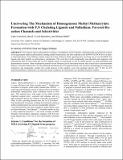Uncovering the mechanism of homogeneous methyl methacrylate formation with P,N chelating ligands and palladium : favored reaction channels and selectivities
Date
26/01/2015Metadata
Show full item recordAbstract
The catalytic alkoxycarbonylation of alkynes via palladium and P,N ligands, studied through a prototypical reaction involving propyne methoxycarbonylation yielding methyl methacrylate, has been explored at the B3PW91-D3/PCM level of density functional theory. Four different reaction routes have been probed in detail, spanning those involving one or two hemilabile P,N ligands and either hydride or carbomethoxy mechanisms. The cycle that is both energetically most plausible and congruent with experimental data involves Pd(0) and two P,N ligands acting co-catalytically in turn to shuffle protons via both protonation and deprotonation reactions. Other mechanisms proposed in the literature can be discounted because they would lead to insurmountable barriers or incorrect selectivities. For the preferred mechanism, the P,N ligand is found to be crucial in determining the strong regioselectivity and intrinsically controls the overall turnover of the catalytic cycle with moderate barriers (ΔG‡ of 20.1 to 22.9 kcal/mol) predicted. Furthermore, the necessary acidic conditions are rationalized via a potential dicationic channel.
Citation
Crawford , L , Cole-Hamilton , D J & Buehl , M 2015 , ' Uncovering the mechanism of homogeneous methyl methacrylate formation with P,N chelating ligands and palladium : favored reaction channels and selectivities ' , Organometallics , vol. 34 , no. 2 , pp. 438–449 . https://doi.org/10.1021/om500970k
Publication
Organometallics
Status
Peer reviewed
ISSN
0276-7333Type
Journal article
Description
The authors would like to thank the University of St. Andrews School of Chemistry and EaStCHEM for supportCollections
Items in the St Andrews Research Repository are protected by copyright, with all rights reserved, unless otherwise indicated.

